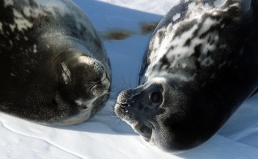Podcast: Play in new window
BOB HIRSHON (host):
Little seals with big heads. I’m Bob Hirshon and this is Science Update.
Life is tough for newborn Weddell seals. They have just six weeks to learn how to hunt beneath Antarctic sea ice before their mothers leave them to fend for themselves.
REGINA EISERT (Smithsonian Institution/University of Canterbury):
Most marine mammals will not enter closed ice because they are afraid of drowning. Basically if you don’t find your exit, you’re dead.
HIRSHON:
That’s comparative physiologist Regina Eisert of the Smithsonian Institution and the University of Canterbury in New Zealand. She and her colleagues have now discovered the key to the baby seals’ rapid learning: big brains.
EISERT:
The newborn Weddell pup has a brain that is around 70% of the adult brain. The largest brain of any mammal studied to date relative to its adult size.
HIRSHON:
She says in contrast, the brains of human babies are only about 25% of their adult size. I’m Bob Hirshon, for AAAS, the science society.

